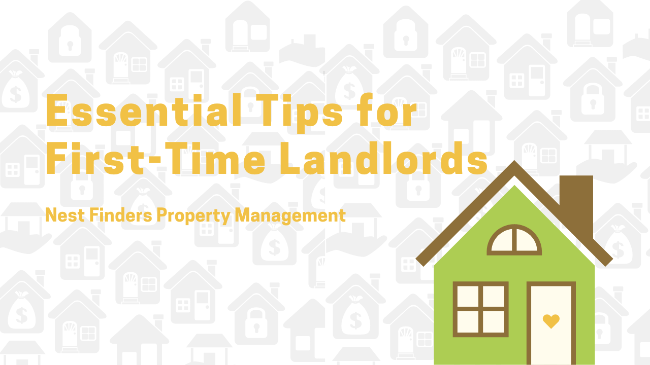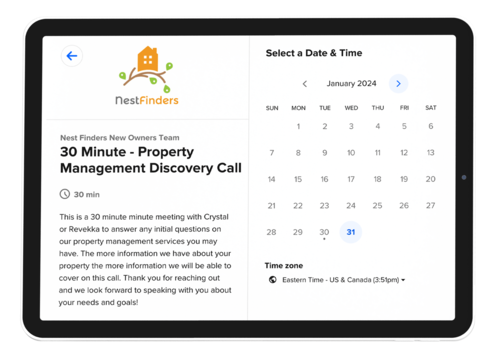Becoming a first-time landlord can be exciting, but it also comes with its fair share of challenges. From finding advertising vacancies to maintaining the property, there are tasks to complete if you want to generate a healthy ROI.
In this article, the experts at Nest Finders Property Management have outlined essential tips to help first-time landlords navigate the world of property management.
Educate Yourself on Landlord-Tenant Laws
As a first-time landlord, it's crucial to educate yourself on laws and regulations governing landlord-tenant relationships in your area. We know legal jargon can be intimidating, but understanding these laws will help you avoid legal pitfalls.
Take some time to research and familiarize yourself with key areas such as lease agreements, eviction processes, security deposits, fair housing laws, and maintenance responsibilities. Staying updated on any changes in legislation will help you comply with the law and prevent potential conflicts with your tenants.
Screen Tenants Thoroughly
Choosing the right tenants is a game-changer when it comes to having a successful rental experience. A comprehensive screening process will help you identify responsible tenants who will take care of your property and pay rent on time.
Start by conducting comprehensive background checks to verify the identity of your prospective tenants and gather information about their rental history. Look out for any previous evictions, late rent payments, or conflicts with past landlords. Then, evaluate their credit report to get a sense of their financial responsibility. Finally, remember to verify their employment status and income stability.
By implementing a thorough screening process, you'll significantly reduce the risk of troublesome tenants and create a positive and reliable rental experience.
Create a Comprehensive Lease Agreement
A solid lease agreement sets the foundation for a successful landlord-tenant relationship. Don't worry; you don't have to be a legal expert to create one. Keep it clear and concise, using language that's easily understandable for everyone involved. Make sure you include essential details such as the rent amount, due dates, accepted payment methods, and penalties for late payments.
If you have specific rules regarding pets or maintenance responsibilities, outline them clearly. And don't forget to include termination clauses that specify the conditions under which the lease can be terminated by either party. If you're not confident in your legal drafting skills, it's a good idea to consult a real estate attorney or property manager to ensure your lease agreement complies with local laws and regulations.
Set a Competitive Rent Price
Setting the right rent price is crucial for attracting quality tenants and maximizing your rental income. Let's go through some key considerations to help you make an informed decision.
Start by researching the local rental market. Look for properties similar to yours in terms of size, amenities, and location, and find out their average rent prices. Take note of any unique features or amenities your property offers that may justify a slightly higher rent.
Consider the current market demand as well. If there's high demand and limited supply, you can set a slightly higher rent price. But be careful not to overprice, as it could result in longer vacancy periods.
To get a clearer picture of rental rates in your area, you can consult local real estate agents or property management companies. They have their finger on the pulse of the rental market and can provide valuable insights to help you determine the optimal rent price.
Maintain Open and Clear Communication
Effective communication is the key to any successful relationship, including the one with your tenants. Establishing open lines of communication will go a long way in building a positive and productive relationship.
Make sure your tenants have multiple ways to reach you, such as by phone or email. Try to respond to their queries, concerns, and maintenance requests quickly. This will show them that you care and are committed to ensuring their tenancy is a pleasant one.
Set clear expectations from the beginning. When you outline your expectations regarding rent payments, maintenance responsibilities, and property use. Make sure your tenants understand their obligations and the consequences of failing to meet them. This will prevent potential disputes in the future.
Schedule Regular Property Inspections
Regular property inspections are essential for ensuring that your property is well-maintained and that your tenants are abiding by the terms of the lease agreement.
Schedule routine inspections to assess the condition of your property and identify any maintenance or repair needs. These inspections can be conducted annually or semi-annually, depending on your preference and local regulations.
Provide your tenants with sufficient notice before conducting inspections. During inspections, take detailed notes and photographs to maintain a record of the property's condition over time. This documentation can be useful when resolving any disputes regarding damages or maintenance responsibilities during or after a tenancy.
Maintain the Property
Proactive maintenance is essential for preserving your property's condition, attracting quality tenants, and maximizing its long-term value. Here are some maintenance tips for first-time landlords:
Implement a preventative maintenance schedule to address minor issues before they escalate into major repairs. Regularly inspect and service HVAC systems, plumbing, electrical components, and appliances.
Respond to maintenance requests and repairs promptly. Timely repairs not only keep your tenants satisfied but also prevent minor issues from worsening and potentially leading to costly repairs in the future.
By proactively maintaining your property, you can provide a safe and comfortable living environment for your tenants, minimize vacancies, and maximize your rental income potential.
Keep Detailed Financial Records
Maintaining accurate financial records is essential for effective property management and tax compliance. Detailed financial records help you track income and expenses associated with your rental property. Here's what you should do:
Open a dedicated bank account for rental income and expenses. Keeping personal and rental finances separate simplifies accounting and makes it easier to track financial transactions.
Document all rent payments received, including the date, amount, and any associated fees or deposits. Consider using digital tools or property management software to streamline rent collection and record-keeping.
Keep records of all property-related expenses, including maintenance and repair costs, property management fees, insurance premiums, property taxes, and mortgage payments. Maintain receipts and invoices as supporting documentation.
Accurate financial records make tax preparation more efficient. Consult with a tax or property management professional who can guide you through applicable deductions, depreciation, and other tax considerations for rental properties.
By maintaining detailed financial records, you gain a comprehensive understanding of your property's financial performance and simplify tax reporting processes.
Conclusion
Congratulations on becoming a first-time landlord! By implementing these essential tips, you are on the path to having a successful rental business. If you want to maximize your ROI and achieve your investment goals, reach out to Nest Finders Property Management!
Our experienced team is dedicated to serving property investors and promoting their success in Jacksonville, FL and the surrounding area.



